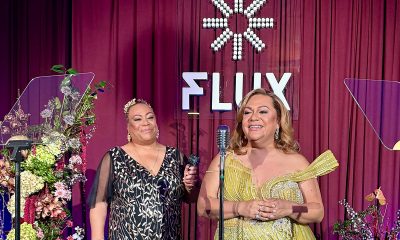West Hollywood
West Hollywood in brief- City government in action this week
Annual city council reorganization incoming Mayor & Vice-Mayor, Reducing Speed Limits, Martin Luther King Jr. Day of Service plus more
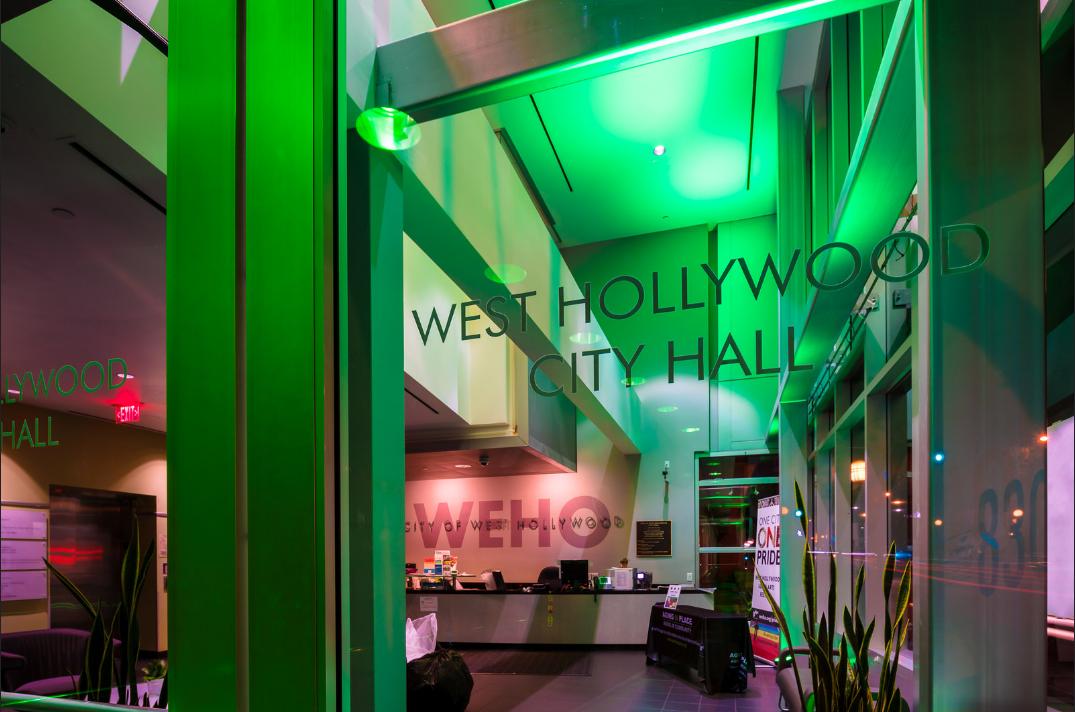
West Hollywood is Informing Landlords about the Los Angeles County Rent Relief Program
WEST HOLLYWOOD – The City of West Hollywood is getting the word out about a recent announcement from Los Angeles County Department of Consumer and Business Affairs (DCBA) regarding the availability of $68,666,000 in grants to qualified landlords with property located within Los Angeles County, excluding the City of Los Angeles, through its Los Angeles County Rent Relief Program.
The City of West Hollywood is in Los Angeles County and this program will provide direct financial assistance to landlords to help them mitigate the detrimental economic impacts caused by the COVID-19 pandemic that may result in tenants’ inability to stay current on rent.
Grant awards may be used to cover eligible expenses incurred from April 1, 2022 to present on a rolling basis. Eligible expenses include qualifying unpaid rental debt and any other substantiated related expenses, such as utilities.
While any eligible landlord can apply, those who meet specific criteria outlined on the County’s website will be prioritized.
For eligibility criteria, required documents, tips for applying, and instructions on how to complete and submit the application, please visit the LA County Rent Relief website at https://lacountyrentrelief.com.The City of West Hollywood’s Rent Stabilization Division provides resources, tools, and information for tenants and landlords in the City of West Hollywood.
For more information, please contact the Rent Stabilization Division at (323) 848-6450 or at [email protected].
For people who are Deaf or hard of hearing, please call TTY (323) 848-6496.
West Hollywood to Host Rainbow Key Awards for 2023 Nominees
The City of West Hollywood and its LGBTQ+ Commission (formerly the LGBTQ+ Advisory Board) will host the City’s annual Rainbow Key Awards ceremony to recognize people and groups who have made outstanding contributions to the LGBTQ community.
This year’s Rainbow Key Awards, which will honor the nominees selected in 2023, will be held in person on Tuesday, January 30, 2024 at 7 p.m. at the West Hollywood City Council Chambers, located at 625 N. San Vicente Boulevard. Additional information for this free event, including registration details, is available by visiting the City’s website at www.weho.org/rainbowkey. For those unable to attend, the event will also be live streamed and recorded for viewing on the City’s WeHoTV channel at www.youtube.com/wehotv.
Every year, the City’s LGBTQ+ Commission selects nominees from a public process. This year’s Rainbow Key Awards honorees, though held in 2024, will honor the 2023 nominees who were selected by the former LGBTQ+ Advisory Board. These honorees are:
- Bert Champagne, a volunteer in the community who has worked for AIDS Walk LA for more than 32 years, served as a Board Member of the California Lesbian Project, and has volunteered for more than three decades at Project Angel Food. Bert currently is the Vice President of Sheryl Lee Ralph’s DIVA Foundation and has been part of DIVAS Simply Singing for more than three decades.
- Nahshon Dion, a multi-talented artist, author, producer, and host of TRANSBRATIONS, a YouTube show.
- Reverend Stephen Pieters, a gay pastor in West Hollywood who became well-known for his extensive AIDS activism after his own AIDS diagnosis in the early 1980s. His soon-to-be-published memoir, Love is Greater than AIDS: A Memoir of Survival, Healing, and Hope, will chronicle his life story. Sadly, Rev. Pieters passed away in 2023, and this award will be presented to his family posthumously.
- Steven Reigns, West Hollywood’s inaugural Poet Laureate, whose writings focus on the gay experience and people with HIV. He has taught poetry workshops across the country to LGBTQ youth groups and people living with HIV.
- Brody Schaffer, a young, 8-year-old dancer who inspires other children to be themselves by fiercely dancing on his social media channels and other dance projects, including TV ads and Nickelodeon programming.
The City of West Hollywood has, since 1993, presented Rainbow Key Awards to people and organizations that have made outstanding contributions to the LGBTQ+ community, bestowing more than 170 awards since the event’s inception. Previous honorees have included activists, artists, civic leaders, educators, community organizations, and many others. Contributions, whether by an individual or a group, can be in many forms, including the arts, community action, humanitarian action, sports, medicine, armed services, leadership potential, benefit to the global LGBTQ+ community, and more.
Since its incorporation in 1984, the City of West Hollywood has become one of the most influential cities in the nation for its outspoken advocacy on LGBTQ+ issues. No other city of its size has had a more significant impact on the national public policy discourse on fairness and inclusiveness for LGBTQ+ people. More than 40 percent of residents in West Hollywood identify as LGBTQ+. The City has advocated for more than three decades for measures to support LGBTQ+ individuals and has been in the vanguard of efforts to gain and protect equality for all people on a state, national, and international level.
For additional information about the Rainbow Key Awards, please contact Moya Márquez at (323) 848-6574 or at [email protected] or visit www.weho.org/rainbowkey.
For people who are Deaf or hard of hearing, please call TTY (323) 848-6496.
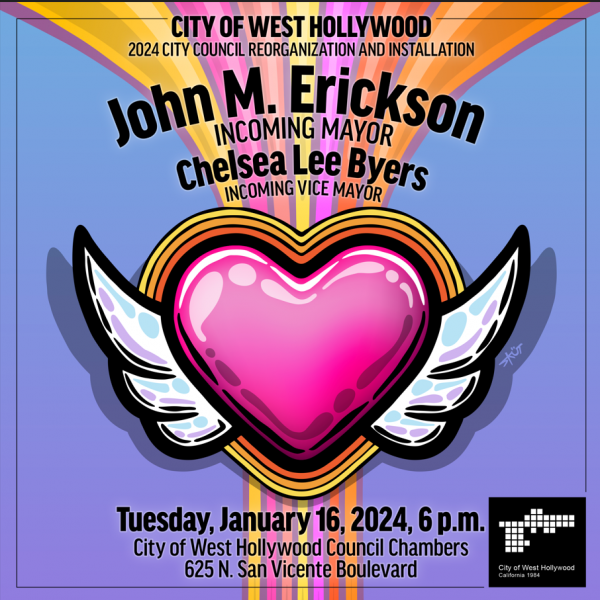
www.weho.org/wehotv and on YouTube at www.youtube.com/wehotv
The City of West Hollywood invites the community to its annual city council reorganization and installation meeting and oath of office ceremony. John M. Erickson will become the next Mayor and Chelsea Lee Byers will become the next Vice Mayor.
The meeting and ceremony will take place on Tuesday, January 16, 2023 at 6 p.m. at the City’s Council Chambers/Public Meeting Room, located at 625 N. San Vicente Boulevard. A reception will immediately follow at the adjacent West Hollywood Library on the second floor. The meeting, ceremony, and reception are free and open to the public. Limited validated parking will be available at the West Hollywood Park five-story structure.
The meeting and ceremony will be live-broadcast and streamed as part of the regular City Council meeting and will be available by tuning into Channel 10 on Spectrum within West Hollywood, by visiting the City of West Hollywood’s website at www.weho.org/wehotv, or by visiting the City’s WeHoTV YouTube Channel at www.youtube.com/wehotv. In addition, City Council meetings can also be viewed on Amazon Fire TV, Android TV, Apple TV, and Roku streaming platforms by searching “WeHoTV” within the search functions of these services.
At its regular meeting on Monday, December 18, 2023, the West Hollywood City Council voted on the selection of the City’s next Mayor and Vice Mayor and adopted a Resolution to change the Mayor Pro Tempore title to Vice Mayor as a local preference, moving forward.
West Hollywood City Councilmembers serve for a term of four years and are elected at large. The City Councilmembers annually select members to serve as Mayor and Mayor Pro Tempore (now Vice Mayor); these positions rotate among the Councilmembers.
About Incoming Mayor John M. Erickson – John M. Erickson, current Mayor Pro Tempore, was elected to the West Hollywood City Council on November 3, 2020, with the commitment to uphold the city’s founding vision for a forward-thinking, diverse, and tolerant community.
Erickson first planted roots in West Hollywood in 2010 when he was selected to intern for the West Hollywood City Council. The internship set him on a path that connected his work for social and economic justice with his passion for public service. He went on to become Council Deputy to former Mayor Abbe Land and then served as a staff member at West Hollywood City Hall working to advance policies, initiate programs, and increase awareness around LGBTQ+ rights, women’s rights, the environment, and civic engagement.
After leaving City Hall, Erickson served as a Legislative Representative at LAX (Los Angeles International Airport) and is currently the Vice President of Public Affairs, Communications, and Marketing at Planned Parenthood Los Angeles.
A past Vice Chair of the City’s Planning Commission, Erickson’s priorities on the City Council include overcoming COVID-19 through sensible health practices and economic recovery; creating more affordable housing and protecting renters’ rights; reducing traffic through alternative transportation strategies, fighting climate change and making our city more sustainable; and implementing policies that make the city truly free of prejudice and welcoming to all.
Erickson has earned a reputation as a fearless, tenacious, and effective voice for those who need one. His advocacy work includes serving as a National Board member of the National Organization for Women and President of the ACLU Southern California. In 2017, he became Governor Brown’s appointee to the California Commission on the Status of Women and Girls and served as an organizer for both the Resist March and the historic Women’s March Los Angeles. He serves on the Board of the Women’s March Los Angeles Foundation. Mayor Pro Tempore Erickson was part of the End Statute of Limitation on Rape (ERSOL) Campaign, which overturned California’s statute of limitations on rape and sexual assault in 2016.
Erickson received his Ph.D. in American Religious History from Claremont Graduate University and a Dual-Master’s Degree from Claremont Graduate University. He graduated from the University of Wisconsin Oshkosh with a B.A. in English and Women’s Studies.
About Incoming Vice Mayor Chelsea Lee Byers – Chelsea Lee Byers, current Councilmember, was elected to the West Hollywood City Council on November 8, 2022.
Byers first became connected to the City of West Hollywood through the Women’s Leadership Conference. This connection led to many program partnerships with the City, including Women Manifest (2016), the Cannabis Education Forum (2015-2018), collaborative film screenings, panels, and more. While working with United Way’s Everyone In campaign, Byers engaged with City Social Services and Strategic Initiatives to bring educational programming to the community on homelessness and housing solutions. She currently works as Director of Programs and Partnership with Women’s Voices Now and is a core team member with Beautiful Trouble.
A past Vice Chair of the City’s Human Services Commission, Byers’ priorities on the City Council include social service delivery, climate-change mitigation strategies, and emergency resiliency efforts, creating more affordable housing and resources for renters; enhancing the streetscape for improved pedestrian and cycling experiences while reducing vehicle-dependency, and community building and policy implementation to ensure West Hollywood is an inclusive community for all.
Byers serves on the Board of Directors for National Women’s Political Caucus as the Vice President of Education and Training for NWPC California. She is a board member of Abundant Housing Los Angeles and President Emeritus of the Westside Young Democrats.
Byers has participated in a number of fellowships including the Housing Policy Leadership Institute, New Leaders Council, Art for LA Activate Program, National Council for Jewish Women’s Advocacy Program, and the James Lawson Institute.
Byers studied at Universidad Internacional Cuernavaca, Franklin University Switzerland and received her B.A. in Political Science and Women’s Studies from Northern Arizona University.
For more information, please call the City of West Hollywood’s City Council Offices at (323) 848-6460.
For people who are Deaf or hard of hearing, please call TTY (323) 848-6496.
City of West Hollywood will Engage Community in Martin Luther King Jr. Day of Service with a School Beatification Volunteer Event and Virtual Donation Drive
The City of West Hollywood will continue its tradition of joining hundreds of communities across the country in a National Day of Service to commemorate the Martin Luther King, Jr. Day federal holiday. On Saturday, January 13, 2024 from 9 a.m. to 1 p.m. the City of West Hollywood encourages community members to participate in the West Hollywood Elementary Beautification Martin Luther King Jr. Day of Service event, located at 970 N. Hammond Street. West Hollywood residents, visitors, and community members are invited to take part in this Day of Service. Volunteers will perform various landscaping, clean-up, painting, and other beautifying tasks at the school.
Details are available on the City of West Hollywood’s Community Engagement and Volunteer Opportunities website page at www.weho.org/volunteer and there is a link to a registration volunteer portal on that page. Volunteers are requested to register in advance and must be 13 years of age or older to participate. All registered volunteers will receive confirmation and check-in details.
This year’s City of West Hollywood Martin Luther King Jr. Day of Service will also include a two-week virtual donation drive to benefit the West Hollywood Homeless Initiative. It will run from Friday, January 12, 2024 through Wednesday, January 31, 2024. Visit www.weho.org/vounteer for details; donations can be made directly online at https://secure.qgiv.com/for/homeless.
The Martin Luther King, Jr. Day federal holiday was designated as a National Day of Service by Congress in 1994. Each year, the City of West Hollywood participates in this call to action. For more information about #MLKDay of Service activities and recognitions across the nation, please visit Martin Luther King, Jr., National Day of Service | AmeriCorps.
For more information about the City of West Hollywood’s Martin Luther King Jr. Day of Service event, please contact Larissa Fooks, the City of West Hollywood’s Community Programs Coordinator, at (323) 848-6413 or at [email protected].
For people who are Deaf or hard of hearing, please call TTY (323) 848-6496.
City of West Hollywood is Reducing Speed Limits on N. Fairfax Avenue and on Fountain Avenue, West of Fairfax Avenue
The City of West Hollywood is in the process of reducing the speed limits on N. Fairfax Avenue and on Fountain Avenue, west of Fairfax Avenue from 35 miles per hour to 30 miles per hour, based on the results of a recently conducted Engineering and Traffic Survey (E&TS).
New speed limit signage will be installed, and new speed limits will be enforced beginning in early 2024. Speed limits in California are governed by the California Vehicle Code (CVC), which states that an E&TS must justify the speed limit on all streets other than local streets if enforcement of the speed limit involves using radar or any other electronic device.
Within the City of West Hollywood, 24 street segments are not classified as local streets, and these streets require an E&TS to justify the posted speed limits. The City of West Hollywood recently retained a traffic engineering consulting firm to prepare a 2023 survey. The State of California guidelines for setting new speed limits, revising existing speed limits, and/or maintaining existing speed limits include the following items: prevailing speeds as determined by traffic engineering measurements; collision records for the most recent two years; and roadway, traffic, and roadside conditions not readily apparent to the driver (i.e., pedestrian activities, bicycle routes, on-street parking, proximity of schools, land use adjacent to the roadway, etc.).
The survey results indicate that the posted speed limits for 22 of the 24 street segments that were evaluated will remain unchanged. The study indicates that the speed limit should be reduced on two street segments: N. Fairfax Avenue between the north and south City boundaries (at Fountain Avenue to the north and Willoughby Avenue to the south); and at Fountain Avenue between N. La Cienega Boulevard and N. Fairfax Avenue. To comply with State law, the posted speed limits on these two street segments will be reduced by 5 miles per hour, from 35 mph to 30 mph. These findings were approved by the West Hollywood City Council in adopting a Resolution at its regular City Council meeting on Monday, October 16, 2023.
For more information, please contact Richard Garland, City of West Hollywood Principal Traffic Engineer, at (323) 848-6457 or at [email protected].
For people who are Deaf or hard of hearing, please call the City of West Hollywood’s TTY line (323) 848-6496.
City of West Hollywood’s ‘2024 Winter Sounds’ Free Indoor Saturday Evening Concert Series Kicks off in January
The City of West Hollywood 2024 Winter Sounds Free Indoor Concert Series will take place on select Saturday evenings at 7 p.m. between Saturday, January 27, 2024 and Saturday, February 24, 2024 at The Sun Rose performance venue at Pendry West Hollywood, located at 8430 Sunset Boulevard. Doors open at 6 p.m., and the concerts begin at 7 p.m. Early arrival is suggested.
The Concert Series will kick off on Saturday, January 27, 2024 at 7 p.m. with three-time Grammy-nominated jazz vocalist Sara Gazarek. She reigns as one of the most creative voices of her generation, and one “who may well turn out to be the next important jazz singer” (LA Times). She has collaborated with jazz legends Fred Hersch, Billy Childs, Kurt Elling, and more, and has six critically acclaimed albums under her belt.
The next concert in the series will feature the gifted multi-instrumentalist Julius Rodriguez on Saturday, February 10, 2024, at 7 p.m. Julius Rodriguez combines his jazz training with his passion for R&B, gospel, and hip-hop. He initially grabbed audiences’ attention touring with A$AP Rocky, Kurt Elling and Charlie Hunter, as well as by working on projects with Meshell Ndegeocello, Kassa Overall, Brasstracks, and others. In 2022, he made his solo debut for Verve Records with the album Let Sound Tell All.
The Winter Sounds Concert Series finale on Saturday, February 24, 2024 at 7 p.m. will feature keyboard maestro, vocalist, composer, producer, arranger, and astral traveler Brandon Coleman. A regular fixture with Babyface, Donald Glover, Flying Lotus, and Kamasi Washington, Coleman represents a new chapter in the evolution of jazz and funk fusion. Following the release of Resistance in 2018, Coleman embarked on a 30 city tour supporting Flying Lotus, laying his interplanetary grooves down for eager audiences.
The City of West Hollywood’s 2024 Winter Sounds Free Indoor Concert Series is organized by the City of West Hollywood’s Arts Division. Winter Sounds concerts are free and guests must be 21 years of age and older to attend. RSVP is recommended. RSVP does not guarantee admittance. Seating is first-come, first-served, limited to availability. Early arrival is suggested. $15 validated valet parking at the Pendry is available for attendees. Street parking may also be available, read local street signage. Rideshare is suggested. For additional information about the performers and to view the series, please visit www.weho.org/wintersounds
For more information about Winter Sounds please contact Joy Tribble, the City of West Hollywood’s Arts Specialist, at (323) 848-6360 or at [email protected].
For people who are Deaf or hard of hearing, please call TTY (323) 848-6496.
City of West Hollywood Encourages Community to Weigh-In on Pedestrian and Bicycle Improvements Around Potential Metro Stations
Metro is studying the proposed Northern Extension of the Metro K Line, which would provide new rail connections to, from, and through West Hollywood, including up to three stations in the City.
The City of West Hollywood is complementing that effort by conducting a Rail Integration Study (RIS) to ensure that future rail service is thoughtfully integrated into the City while supporting sustainability goals and community expectations. The current phase of the study focuses on improving multimodal transportation and providing safe routes to and from planned stations to maximize access, ridership, and use of future stations in West Hollywood.
The City has audited a half-mile area around each potential station to explore potential pedestrian and wheeled access improvements. Now, the City is soliciting input from the community through its new Engage WeHo digital engagement tool to confirm those findings and share additional suggestions with the project team. The project team will evaluate community feedback and suggestions to inform a draft first/last mile plan, which will be presented to City advisory boards, commissions, and the City Council. The City will transmit the approved plan to Metro and incorporate it into future updates to the City’s Capital Improvement Plan and other mobility planning documents that guide future infrastructure investments.
The City invites residents, businesses, and frequent visitors to share their feedback and suggestions on Engage WeHo to inform the plan’s development. The survey is open now and will remain open through Wednesday, February 7, 2024. Participants can provide input through an online form on any of the three stations proposed in West Hollywood as well as the Citywide bicycle network. Interactive online maps are also available to allow participants to place suggestions for improvements directly on online maps. While Metro has not yet decided upon how many stations will serve West Hollywood, pedestrian and bicycle improvements identified for any of the proposed station areas may be relevant regardless of the final route Metro selects as the City continually works to improve safety and mobility for pedestrians and bicyclists.
Learn more and take part in the survey at engage.weho.org/metroFLM.For more information, please contact David Fenn, Senior Planner, at (323) 848-6335 or [email protected]. For people who are Deaf or hard of hearing, please call TTY (323) 848-6496.
City of West Hollywood to Host a Screening of Shepherd: The Story of a Jewish Dog Followed by a Conversation with Writer/Director Lynn Roth in Recognition of International Holocaust Day of Remembrance
The City of West Hollywood will host a film screening of Shepherd: The Story of a Jewish Dog in recognition of International Holocaust Day of Remembrance. The screening will be followed by a conversation with the film’s writer and director Lynn Roth. This free event will take place on Saturday, January 27, 2024 at 6 p.m. in the City of West Hollywood’s Council Chambers/Public Meeting Room, located at 625 N. San Vicente Boulevard. RSVP is requested at https://shepherdfilmscreening.splashthat.com.
Shepherd: The Story of a Jewish Dog chronicles the unbreakable bond between a boy and his dog, Kaleb, a beloved German Shepherd, during the 1930s in Germany. The film is based on the award-winning and bestselling novel The Jewish Dog by Asher Kravitz and tells the story largely from the dog’s perspective. The film was released both nationally and internationally and has been featured at many film festivals, including the Toronto Jewish Film Festival and the Los Angeles Jewish Film Festival, where it won Best Feature Film.
Lynn Roth is an Emmy-nominated filmmaker. She also directed the award-winning feature film The Little Traitor based on famed Israeli novel Panther in the Basement by Amos Oz, which starred Alfred Molina. As well as serving as executive producer for the highly acclaimed series, The Paper Chase, Lynn has the distinction of being the first female showrunner for a dramatic television series.
The City of West Hollywood has a long history of commemorating victims of the Holocaust as part of recognition of a Day of Remembrance of the Holocaust, Yom HaShoah. Yom HaShoah is observed as the day of commemoration for the approximately six-million Jews and five million others who perished in the Holocaust because of the actions carried out by Nazi Germany and its accessories. The City of West Hollywood is home to many Holocaust survivors and family members of Holocaust survivors.
In addition to Yom HaShoah, in November 2005, the United Nations General Assembly officially designated January 27 each year to mark International Holocaust Remembrance Day. The date marks the anniversary of the liberation of the Nazi Concentration and Extermination Camp of Auschwitz-Birkenau by Soviet troops on January 27, 1945.
In addition to recognition of International Holocaust Day of Remembrance, the City of West Hollywood regularly co-sponsors film screenings and discussions to bring awareness to human rights issues as part of its Human Rights Speakers Series, which encourages communities within West Hollywood and beyond to learn about and discuss human rights issues in a shared cultural and educational experience. For additional information, please visit www.weho.org/hrss.
For more information about this event, please contact Jennifer Del Toro, the City of West Hollywood’s Community and Legislative Affairs Supervisor at (323) 848-6549 or at [email protected].
For people who are Deaf or hard of hearing, please call TTY (323) 848-6496.
****************************************************************************************
For up-to-date information about City of West Hollywood news and events, follow @wehocity on social media, sign-up for news updates at www.weho.org/email, and visit the City’s calendar of meetings and events at www.weho.org/calendar. West Hollywood City Hall is open for walk-in services at public counters or by appointment by visiting www.weho.org/appointments. City Hall services are accessible by phone at (323) 848-6400 and via website at www.weho.org. Receive text updates by texting “WeHo” to (323) 848-5000.
West Hollywood
John Heilman and Danny Hang will serve as WeHo’s new Mayor and Vice Mayor
Last night, community members and local officials gathered to celebrate new leadership and bid a warm farewell to outgoing Mayor Chelsea Byers.
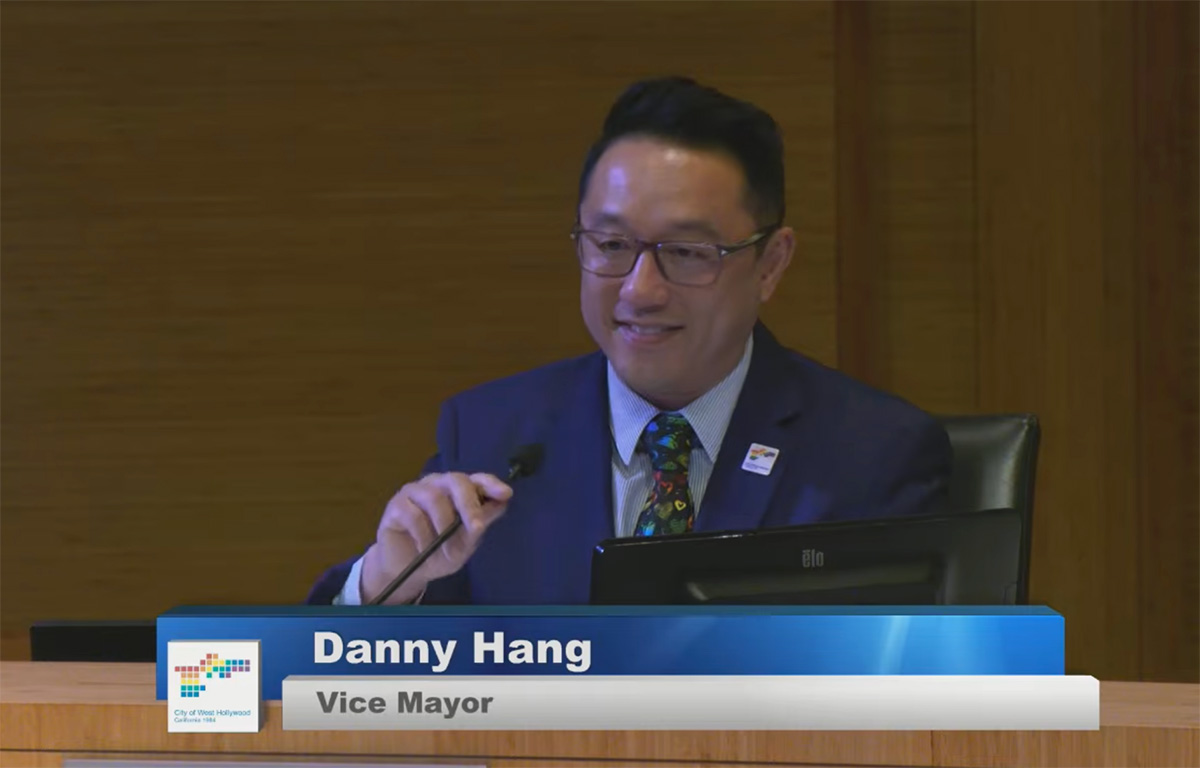
On Jan. 12, West Hollywood residents packed the City’s chambers at 6 p.m. to honor the work of outgoing mayor Chelsea Byers and witness councilmembers John Heilman and Danny Hang take their oath of office as they respectively assume their roles as Mayor and Vice Mayor for 2026.
In her last address as Mayor, Byers spoke about the optimism she holds onto in these unsteady times. To her, West Hollywood is a unique City: one that has become a model for what can be possible in an unjust society. “It’s us against the world. It’s West Hollywood on the stage,” Byers said. “It’s our story to tell, and every single person here contributes in such great ways to that.”
Byers was awarded a plaque on behalf of West Hollywood council members for her outspoken commitment to LGBTQ+ rights, economic justice, housing affordability, and policies that emphasize equity and inclusivity in West Hollywood.
Her leadership remains a bright, guiding light for Mayor Heilman, who was part of West Hollywood’s first city council after the independent city was incorporated in 1984. The spirit of that initial group remains today: queer, progressive, and led for and by the people. Yesterday’s ceremony marked the beginning of Heilman’s ninth time serving as Mayor, as well as his last year on the city council due to term limits.
Now, he leads side-by-side with a self-proclaimed “newcomer,” Danny Hang.
From the 626 to the Westside: Hang’s roots and journey
Hang was born in Monterey Park, a city in the San Gabriel Valley. The region is known for its diverse communities and AAPI-rich culture and history, and Hang recounted to the Blade the deep sense of belonging and comfort he felt growing up there. “I could go to a restaurant, speak Vietnamese or Chinese,” Hang said. “There are people who look like me out there. It is my home away from home.”
After college, he worked at the Social Security Administration, where he helped retirees, disabled people, and those impacted by loss file for Supplemental Security Income (SSI). The work was fulfilling, and he loved feeling that he had a tangible impact on others’ lives: that he could help residents grappling with difficult bureaucratic processes.
This passion grabbed the attention of L.A. County Supervisor Lindsey Horvath, who tapped Hang into serving on West Hollywood’s Disabilities Advisory Board in 2017. Hang eagerly accepted the role, having always been drawn to the vibrant, queer cultural hub. “WeHo was always the land of the unicorn: the land of magic,’ Hang told the Blade. “[This] was a town where I could be open, by myself, and find other people who were also LGBTQ+.”
After serving on the City’s Disabilities Advisory Board and, subsequently, the county’s Business License Commission, Hang noticed a lack of AAPI representation in local leadership. “There aren’t many AAPI people at all in West Hollywood. After I was on the commission, [I thought]: Hey, I think I want to run for city council,” Hang told the Blade.
Creating more inclusive leadership in WeHo
In 2024, Hang was elected to West Hollywood’s city council, becoming the first AAPI councilmember in the City’s 40 year legacy. “I want to see people who look like me in local government, because I want this community to be reflective of the modern-day people who live here. We’re a diverse community, and there’s no reason why we shouldn’t have people of color on the council, as well as more people of color appointed to our boards and commissions.”
Last night, local officials offered encouragement, support, and affirmation to Hang after he took his oath of office. “You’re already making history and certainly making waves across, not just your home region of the San Gabriel Valley, but certainly in California,” said Monterey Park councilmember Henry Lo.
Afterwards, Hang addressed the room, thanking residents, fellow council members and his family. “Standing here as the first AAPI elected to the West Hollywood City Council is deeply meaningful, and I couldn’t have done it without my parents. [They’re] right here in the front row,” Hang said. “My dad was a union worker, who showed me why standing up for workers matters. And my mom worked in a small business, owning a little nail salon in South Pasadena. She taught me what it means to care for others and to keep the community going.”
The year ahead: Heilman calls for residents to unite
Afterwards, Mayor Heilman spoke at length about the upcoming transitional year, the urgency of the current political climate, and ways that community members can step up to support each other. In his last term, he has set his eye on revitalizing the Sunset Strip, stabilizing rent and increasing housing affordability as well as examining the safety of the City’s foundational buildings, including the library and fire station.
He concluded his speech by making an unwavering stance on the “appalling” state of the federal government, stating that every West Hollywood resident must step up together in the face of ongoing federal attacks on the rights of LGBTQ+ people, specifically transgender people, as well as immigrants and other marginalized community members.
“This is a direct attack on our residents. It’s a direct attack on all of us,” Heilman said. “Now is not the time to hide. We need you…Ask what you can do to help people in the community,” he said, galvanizing residents to volunteer for the City’s various social services, nonprofits like Hollywood Food Coalition and Ascencia.
This call for unity and communal bravery echoes Byers’ belief in the courage of the people of West Hollywood. “41 years ago, a group of people defined what government could be,” Byers said. “We’re living the wildest dreams of people decades ago…and we get to be a bridge for that hope for the future. In such a critical moment, it’s truly our responsibility.”
Kristie Song is a California Local News Fellow placed with the Los Angeles Blade. The California Local News Fellowship is a state-funded initiative to support and strengthen local news reporting. Learn more about it at fellowships.journalism.berkeley.edu/cafellows.
West Hollywood
Administration refused to honor World AIDS Day; residents gathered with defiance, grief and love
Yesterday, members of the APLA Health Writers Group read moving stories to a large group of locals gathered at the AIDS monument.
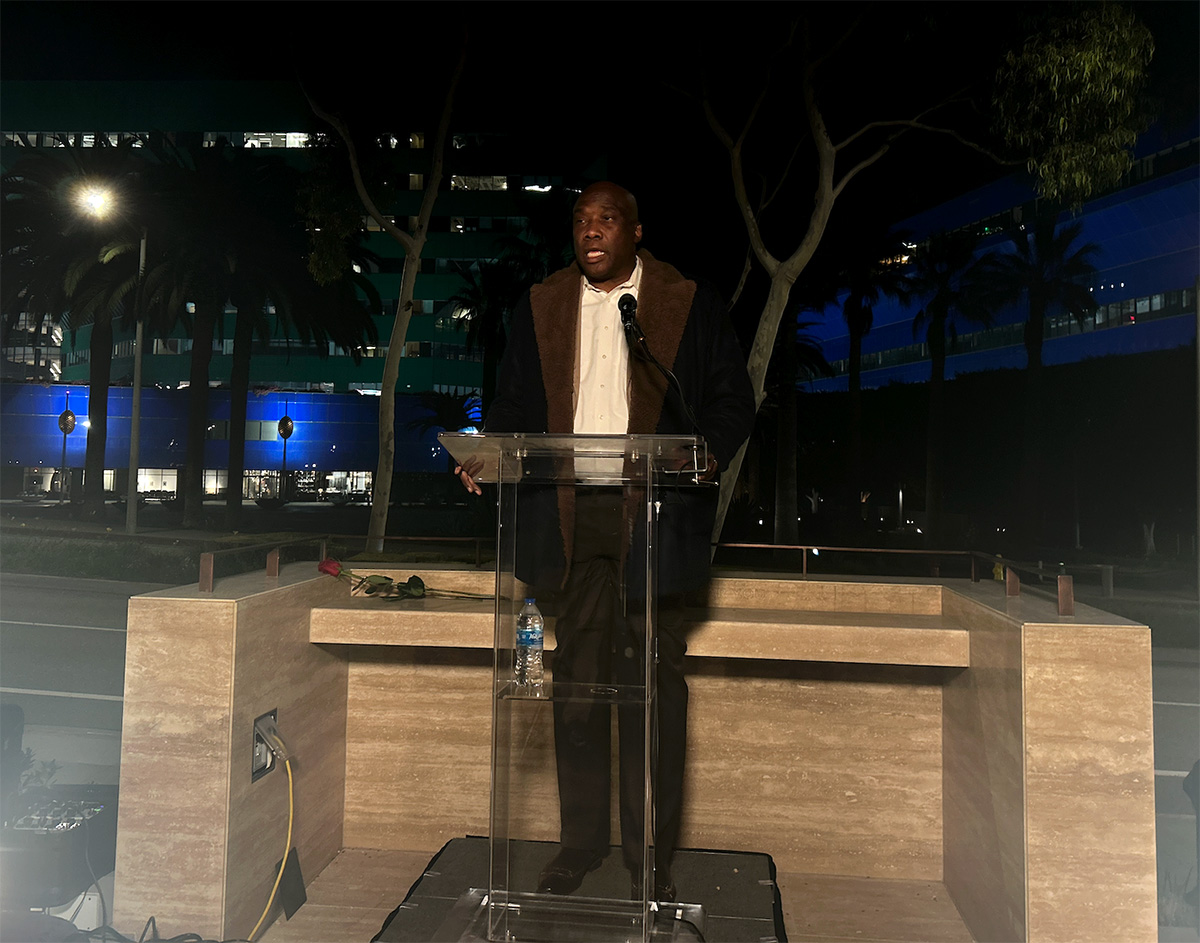
On Monday, the federal administration did not honor World AIDS Day, for the first time since the international awareness day was created in 1988. In addition to significant funding cuts to organizations focusing on HIV preventative treatment and care, the government’s halting of this commemoration perpetuates a dismissive system of inaction against LGBTQ+ people.
And yet, over 50 community members filled the empty spaces of West Hollywood’s AIDS monument yesterday evening, waiting in the night chill as city officials delivered impassioned statements and writers from APLA Health read personal pieces that centered a grief and love for those lost to the epidemic.
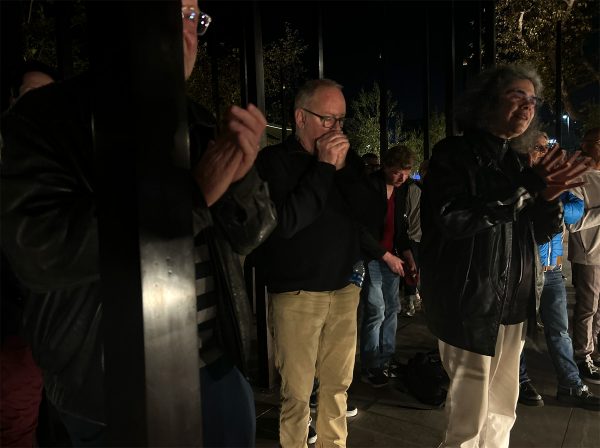
Before the readings began last night, West Hollywood vice mayor John Heilman asked for residents to join him in a righteous rage against administrative apathy. “I want to ask us all to reflect for just a moment about all of the people we lost…I want us to reflect and get angry,” said Heilman. “We have a fucking president who won’t even recognize World AIDS Day.”
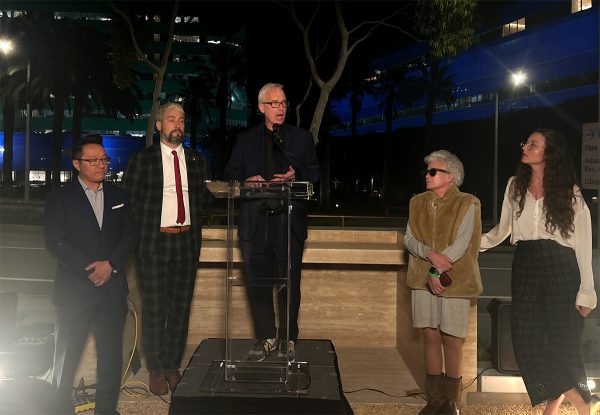
Irwin Rappaport, board chair for STORIES: the AIDS monument, echoed this immense disappointment. “Many of us here tonight lived through the 1980s, so we know what that’s like,” Rappaport said. “We also know that because of that neglect, because of that lack of caring from the federal government, we have to care for one another — and we know how to do that. When we don’t have recognition from others, we know how important it is to preserve our own history, to tell our own stories.”
Through heavy silence, five writers from APLA Health’s writers group stood tall before a podium and shared intimate writings they created about the epidemic and its personal impact on them. The collective was established in 1989 to provide an inclusive, expressive space for HIV-positive writers and allies to work on their writing and learn how to share their stories.
Writer Brian Sonia Wallace, who served as West Hollywood’s poet laureate from 2020 to 2023, has been working with the writers group for the last four years to help them hone and refine their narrative voices as they share their heaviest grief and the depths of their love for the people they lost to HIV and AIDS.
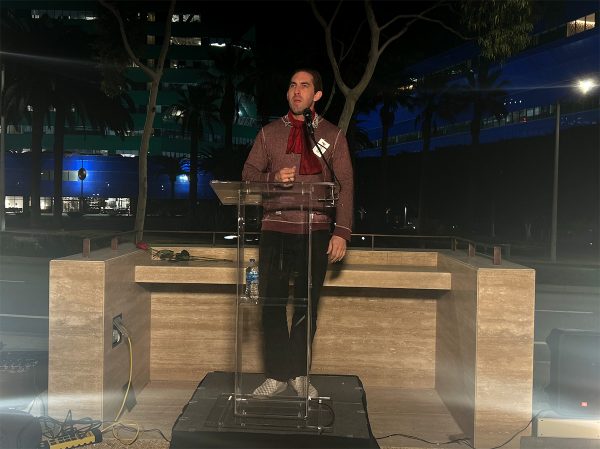
Hank Henderson, one of these writers, read from a diary entry from November 29, 1991. His voice, clear and strong, wavered as he shared about the death of his dear friend Richard. In a piece filled with lush, rich detail, painted clearly with a strong and loving voice, Henderson recounted a memory with Richard during the latter’s last years.
“The Santa Barbara sky is clear blue forever today…Yesterday came and went like a half-remembered dream between snooze alarms,” Henderson recited. “Last year, we walked to the beach. We spent hours there, played frisbee ourselves, brought the dog. Richard even yelled out 30-minute tanning turnover alarms. Yesterday, he took tiny, labored steps back to the car, used my shoulder to keep himself from falling over. Nobody said anything. We just pretend it’s normal.”
Another writer, Austin Nation, shared the story of being told he was HIV-positive at 26 years old. As a young nurse, he remembered the shock of seeing “young, beautiful men” arriving at the hospital covered in “purple, blotchy sores.” When he received his own test results, a paralyzing terror washed over his body. An incredulity followed the fear: why was this happening to him? “I got this thing for what?” Nation spoke. ”For having fun? For making love? And now it’s gonna cost me my life?”
But as he stood before the crowd, now 63 years old, he was met with applause and joy as he stated and repeated: “I’m still here. I’m still here.” The writers, in their grief and loss, have come to a place where they are able to share these stories, empowered and held. “In a world that writes off people with stories like mine,” Nation said. “It’s a hell of a good day to be alive.”
Kristie Song is a California Local News Fellow placed with the Los Angeles Blade. The California Local News Fellowship is a state-funded initiative to support and strengthen local news reporting. Learn more about it at fellowships.journalism.berkeley.edu/cafellows.
West Hollywood
West Hollywood kicks off community-focused programming for World AIDS Day
Since 1988, queer communities have come together on Dec. 1st to honor siblings and allies lost to the AIDS epidemic.
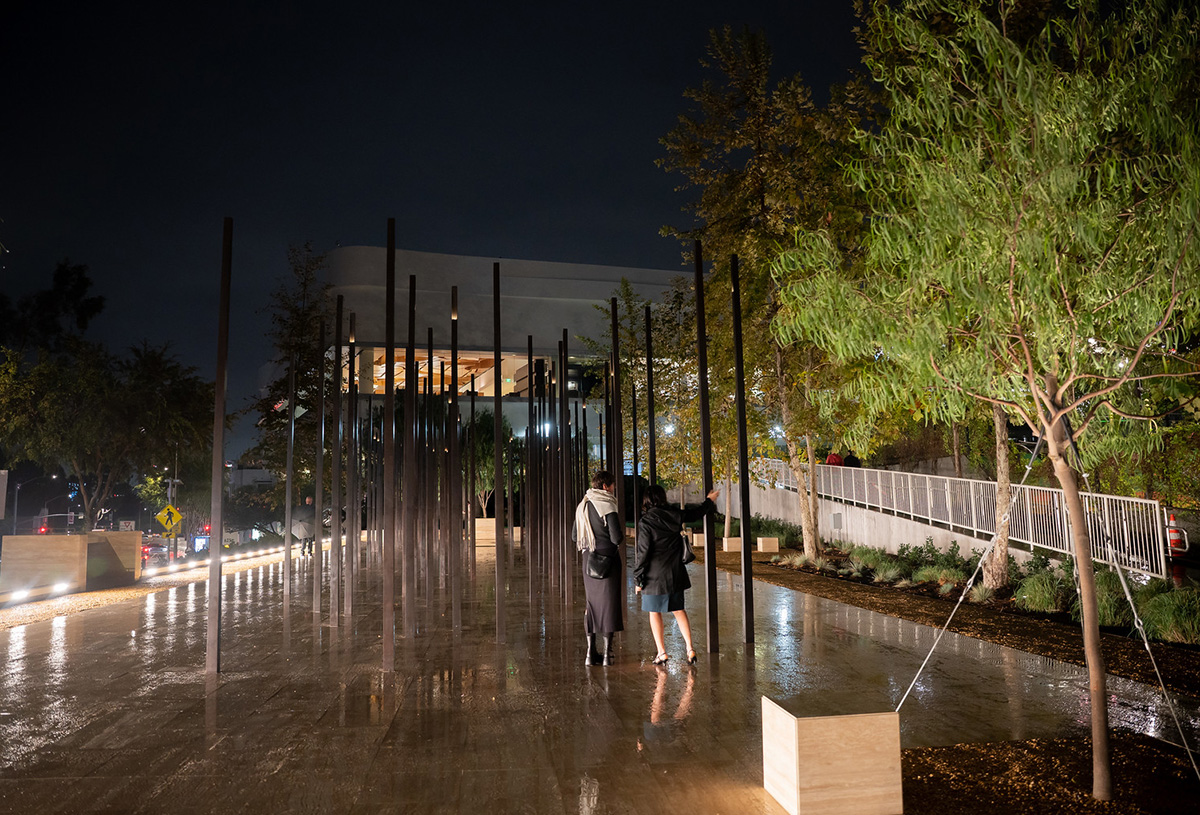
Since 1988, LGBTQ+ communities have come together on Dec. 1st to commemorate queer siblings and allies lost to the AIDS epidemic. This year’s World AIDS Day follows the theme “Overcoming disruption, transforming the AIDS response” and highlights the substantial funding cuts to research, health services, and community initiatives that have prioritized the safety of people with HIV and AIDS. The theme challenges people to think about “radical” ways to organize together and ensure that those who are impacted are able to access the care, treatment, and awareness that they need.
Beginning today, the City of West Hollywood is kicking off programming to recognize the historical transformation that local queer communities experienced during the AIDS epidemic. A panel from the AIDS Memorial Quilt will be available for viewing at the City’s Council Chambers at 625 N. San Vicente Boulevard through Monday, Dec. 15th.
Known as the largest community arts project in history, the Quilt is a powerful memorialization of loved ones who died during the epidemic. Each panel of the Quilt contains a story of remembrance, immortalizing a life cut short during the crisis. The project currently contains over 50,000 panels dedicated to over 110,000 people, all woven together in a 54-ton tapestry piece.
If you’re visiting the panel today, there will be an additional gathering opportunity tonight at the West Hollywood Park for STORIES: the AIDS Monument. From 5:30 to 8:30 p.m., members from the HIV-positive writers collective APLA Health Writers Group will present intimate readings that reflect on their experiences. Community members will be allowed time to wander through the monument and also preview the new Herb Ritts: Allies & Icons exhibition at ONE Gallery after the program. The art show includes striking black and white portraits of activists who stood in alliance with those most impacted during the AIDS epidemic.
Additionally, fresh flowers will be placed on the bronze plaques that line the City’s AIDS Memorial Walk. During the AIDS epidemic, West Hollywood was at the center of a rampant grief and loss that juxtaposed vibrant programming and efforts that boosted healing and fought against stigma and violence. It continues to be a vibrant space that houses various organizations and memorial spots that continue to uphold the revolutionary history and advocacy work that has continued since the epidemic’s beginnings.
Today, West Hollywood is in the process of executing its HIV Zero Strategic Plan, an initiative that began in 2015. Its goals include: expanding healthcare access for people living with HIV and AIDS, reducing the rate of infections, lessening health disparities and inequities for those impacted, and slowing the disease’s progress from advancing to AIDS.
According to West Hollywood mayor Chelsea Byers at a recent Cityhood event, the initiative carries forth the City’s “bold vision” and commitment to ensuring marginalized community members living with HIV do not face the life-threatening discrimination and health barriers that their elders experienced.
To learn more about the City’s programming, read here.
Kristie Song is a California Local News Fellow placed with the Los Angeles Blade. The California Local News Fellowship is a state-funded initiative to support and strengthen local news reporting. Learn more about it at fellowships.journalism.berkeley.edu/cafellows.
West Hollywood
Today, West Hollywood celebrates 41 years of queer cityhood
WeHo’s city officials are trying to preserve the fight for queer safety and rights that began decades before.
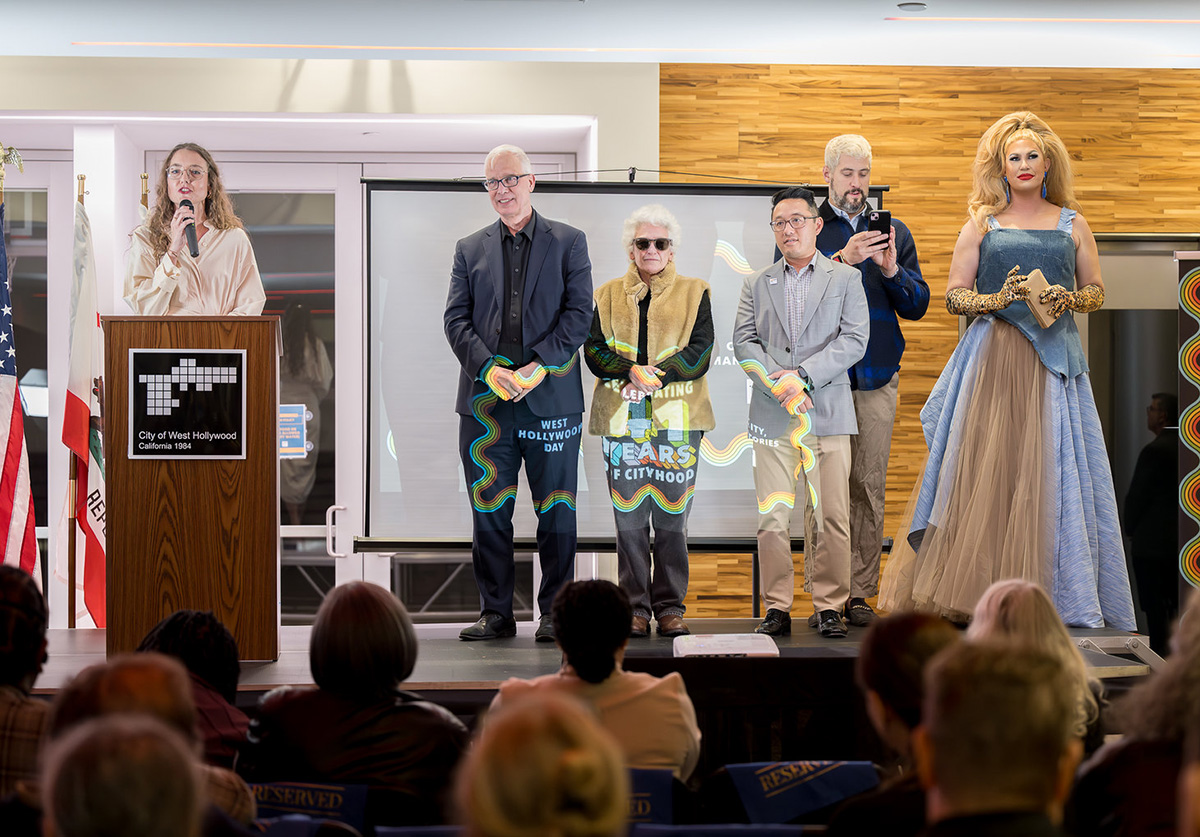
On Nov. 29th, 1984, West Hollywood was incorporated as an independent City, making its sovereignty official and solidifying it further as a sanctuary for LGBTQ+ community members, their stories, and their freedoms. Inspired by other prominent gay neighborhoods like New York’s West Village and San Francisco’s Castro District, West Hollywood was established by local queer advocates and residents. Their first city council was made up of a majority gay governing body — the first in the world, according to the West Hollywood History Center.
This political legacy, and the city’s vibrant and proudly queer history, continues to be preserved. On Monday’s celebratory event, West Hollywood mayor Chelsea Byers announced that the City’s current council “continues to be a majority-LGBTQ+ body,” holding tightly onto a “spirit” that reflects, prioritizes, and fights for Los Angeles’ queer community.
West Hollywood has been through various transformations, cocooning and revitalizing itself through the country’s evolving political and cultural upheavals. It has long been home to a ravishing nightlife that celebrates LGBTQ+ expression, and was a focal point for queer-led liberation and activism in the late 1960s and early 1970s. Trailblazers like Morris Kight led the first gay pride march through West Hollywood’s streets in 1970 and opened the Los Angeles LGBT Center to nourish the City’s robust and blossoming queer communities.
Today, West Hollywood continues to be the place where queer organizers and residents plant roots. Earlier this month, STORIES: the AIDS monument opened up in the City’s park after over a decade of work, shining a light on the legacies of gay activists, artists, historians, and community members who fought to survive as anti-gay stigma led to the erasure of their rights and lives.
As waves of anti-LGBTQ+ hate and violence continue to surge through the country, West Hollywood elected officials aim to continue doing the critical work that began decades before them: the work that protects the ability of queer residents to advocate for themselves, to live with protections and dignity, and to relish in joy. Mayor Byers is inspired by the resilience of the community members who stood together to establish this independent City in 1984. “The people who lived here…wanted a city with strong protections for renters, with progressive policies, and with a local government that would actually reflect and protect the people who call this place home,” said Byers, at the Nov. 24th celebration.
Over 40 years later, these needs have not changed. The way forward? Remembering and fighting for that initial promise and hope. “We are a chorus. We are a tapestry,” said Byers. “We are the product of thousands of people who, for more than four decades, have dared to say: We can build something better here.”
Kristie Song is a California Local News Fellow placed with the Los Angeles Blade. The California Local News Fellowship is a state-funded initiative to support and strengthen local news reporting. Learn more about it at fellowships.journalism.berkeley.edu/cafellows.
West Hollywood
From nickname to reality, the Rainbow District is made official by the City of West Hollywood
The mile along Santa Monica Boulevard from N. Doheny Drive to N. La Cienega Boulevard welcomes residents and visitors to come as they are
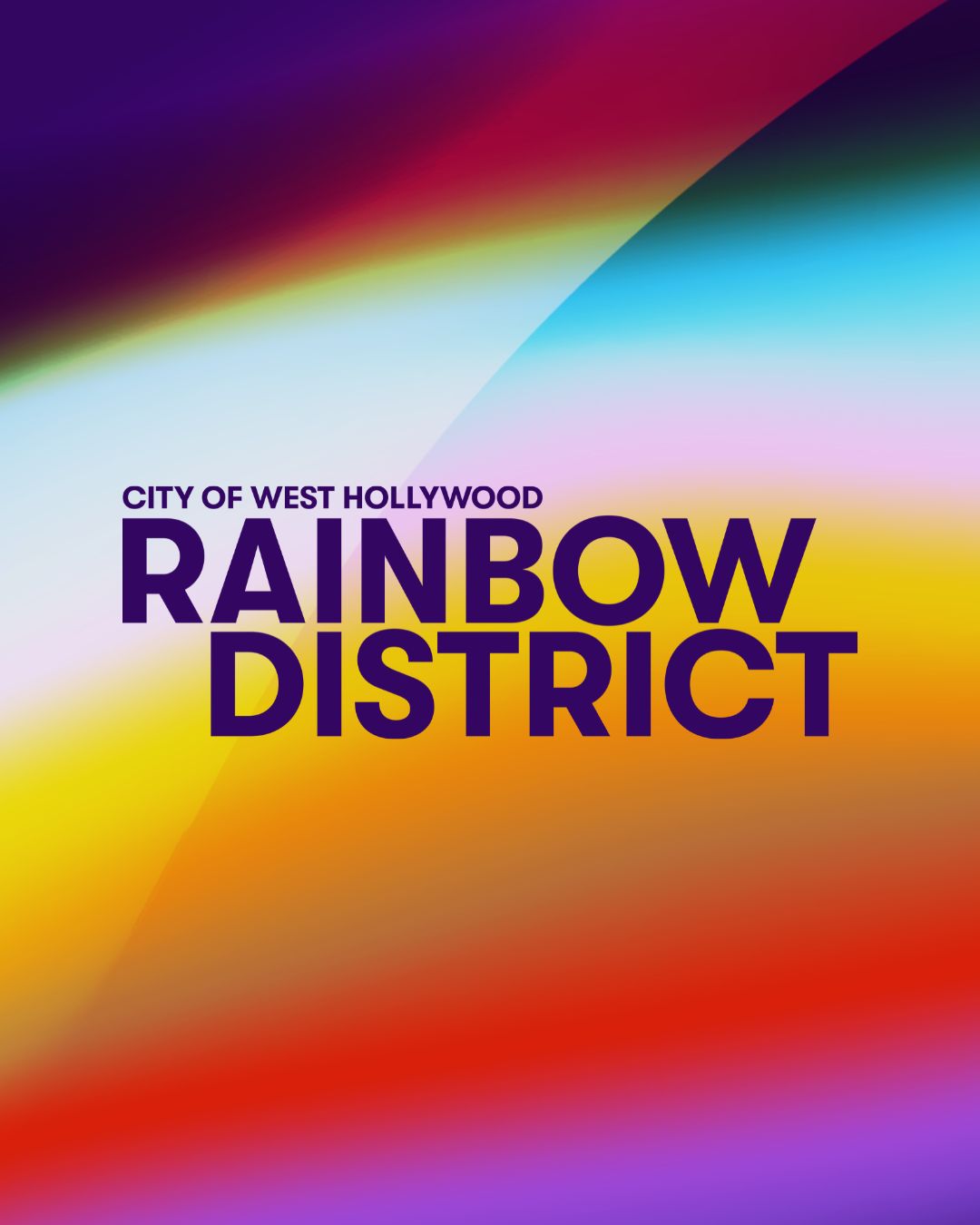
Even in today’s political climate, we will not be hidden.
The vibrant stretch on Santa Monica Blvd of over 50 local businesses, representing the full spectrum of LGBTQ+ expression, from N Doheny Dr to N La Cienega, has had the loving nickname of the Rainbow District for decades. Well, now it’s official. From nightlife to restaurants to community organizations, the City of West Hollywood has formally designated the space as such, honoring the neighborhood’s legacy as a safe haven for the queer community and beyond.
In addition to making the name official, the Rainbow District is being launched with a full range of social media, including Instagram, TikTok, and Facebook, keeping the residents and visitors updated on all upcoming events and happenings in the neighborhood.
Long known as a beacon of acceptance, inclusion, and visibility, where everyone is welcome, this iconic mile-long corridor is now formally recognized for what it has always been: a place where people from every walk of life can come together, be themselves, and celebrate the beauty of diversity.
City of West Hollywood Mayor Chelsea Lee Byers states, “For generations, the City of West Hollywood’s Rainbow District has been a place where LGBTQ+ people take their first steps into living openly, where the warm embrace of community is found at every turn, and where the joy of living out, loud, and proud fills the streets. The City’s official designation of the Rainbow District honors both the legacy and the future of this vibrant neighborhood, home to beloved entertainment venues, bars, and restaurants that have long served as cornerstones of LGBTQ+ life. Today, the Rainbow District is more alive than ever, and it will always stand as a beacon of hope, pride, and belonging and as a reminder that everyone deserves a place to celebrate joy, to be seen, and to be supported.”
The Rainbow District officially joins a nationwide list of iconic LGBTQ+ landmarks. West Hollywood will not be hidden amid political backlash and will continue to protect queer spaces, uplift queer voices, and foster a safe and joyful environment for all.
“This designation is not only a celebration, but it also serves as a promise,” said Visit West Hollywood President & CEO Tom Kiely. “A promise to keep LGBTQ+ spaces visible, valued, and vibrant for generations to come. As the Rainbow District continues to evolve, it will remain a place where locals and visitors alike can connect through culture, creativity, and community. The City’s formal designation affirms its significance and highlights The Rainbow District as the ultimate playground for travelers seeking a unique, inclusive, and authentic experience.”
The Rainbow District will be home to upcoming community events that include:
- Winter Market & Ice Skating Rink — December 2025
- Go-Go Dancer Appreciation Day — March 2026
- Harvey Milk Day — May 22, 2026
- WeHo Pride Weekend & the OUTLOUD Music Festival at WeHo Pride — June 5–7, 2026
Follow the Rainbow District on socials to discover local happenings, support small businesses, and be part of a neighborhood that celebrates every person for exactly who they are.
Instagram: @RainbowDistrictWeHo TikTok: @RainbowDistrictWeHo
Facebook: facebook.com/rainbowdistrictweho More Info: visitwesthollywood.com/rainbowdistrict
West Hollywood
West Hollywood’s AIDS Monument preserves the pain and power of people lost to the crisis
STORIES: The AIDS Monument is now available to view at West Hollywood Park, 15 years after its conception.
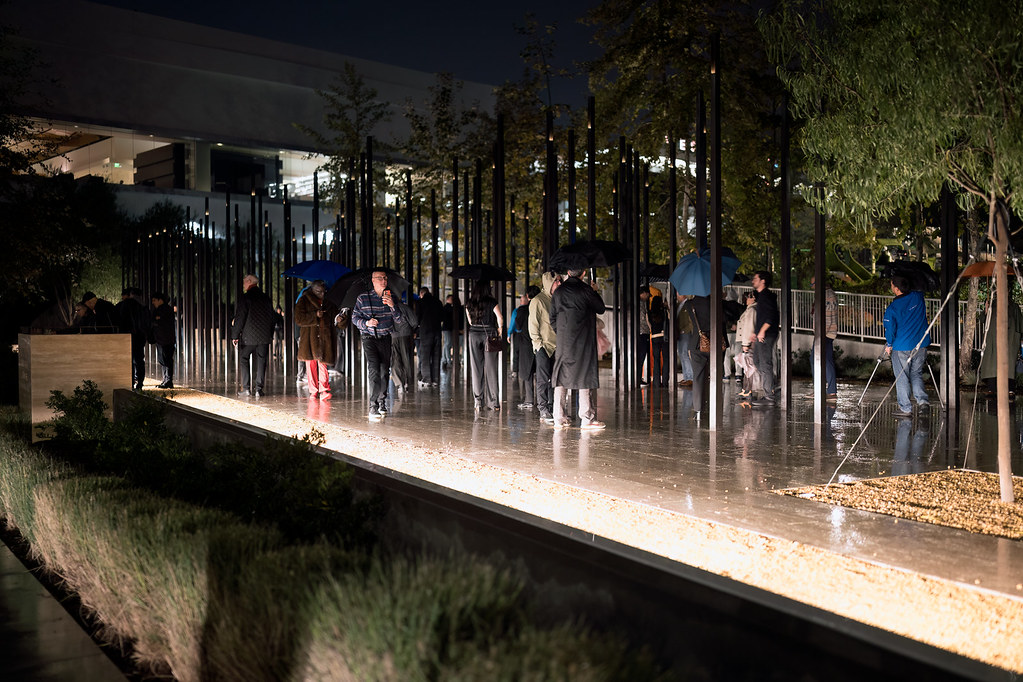
It was 1985, at the height of the AIDS crisis, when Irwin Rappaport came out as gay. As he came to terms with his identity, he witnessed people around him grow weaker: their faces becoming gaunt, painful lesions developing on their bodies. Five years later, he began volunteering as a young lawyer at the Whitman-Walker Clinic, a community health hotspot in Washington, D.C. that created the first AIDS hotline in the city, opened homes for patients with AIDS, and distributed materials that promoted safe sex.
The work being done at the clinic was instrumental, essential, and deeply painful. “When you see that sickness and experience that death among your friends and people you know, and when you’re writing wills for people who are much too young in ordinary times — it has an impact,” Rappaport told the Blade. “And even though in 1996 we saw life-saving medications come around, you never forget the sense of fear that permeates your life. The sense of loss.”
Determined to honor and share the legacies of people who died from AIDS, Rappaport joined the Foundation for the AIDS Monument (FAM) board to work towards the organization’s goal of creating a physical monument dedicated to memorializing these histories. FAM treasurer Craig Dougherty first conceived of this project in 2010 and, after 15 years, STORIES: The AIDS Monument is now available to the public for viewing.
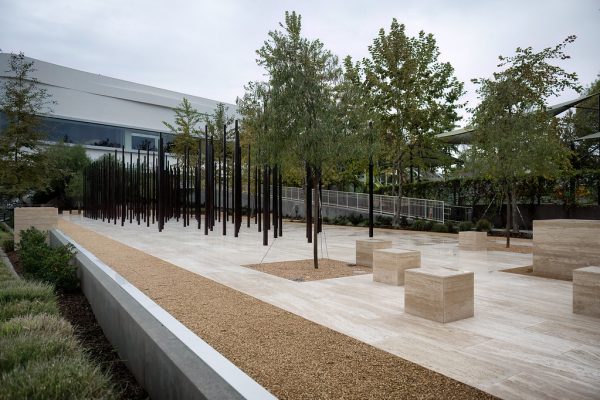
Created in collaboration with the City of West Hollywood, STORIES: The AIDS Monument is composed of 147 vertical bronze pillars known as “traces.” Designed by artist Daniel Tobin, 30 of these traces are engraved with words like: activism, isolation, compassion, and loss, which correlate to the over 125 audio stories collected and archived on the foundation’s website. This multimodal storytelling allows people who come across the monument to engage more intimately with the people represented by these physical pillars.
At nighttime, lights transform the monument into a candlelight vigil, providing a warm glow to a wanderer’s journey through the structure.
When people were able to walk around the traces at Sunday’s grand opening ceremony at the Pacific Design Center, the last remnants of the weekend’s rainstorm created a kind of “spiritual” and reverent atmosphere for those gathering, according to Rappaport. “I think there’s a certain peacefulness and serenity about the design, an opportunity for reflection,” he continued. “For some, it may bring back incredibly painful memories. It might bring back wonderful times with friends who are no longer here. It might remind them of their own caregiving or activism, or the sense of community that they felt in striving with others to get more attention to the disease.”
Now that the monument has been built, FAM has passed the mantle of management and programming to One Institute, a nonprofit that engages community members with queer history through panels, screenings, and other educational initiatives. One Institute plans to host monthly docent tours, art installations, and other special events during various LGBTQ+ national awareness days, including the upcoming World AIDS Day in December.
Rappaport also hopes to do outreach with local schools, so that young students are able to engage with the monument, learn about the people who were affected by the AIDS crisis, and interact with the ripples of transformation that this time period sparked in politics, research, the arts, and within society. “For younger people, I think [this is] an invitation for them to understand how they can organize about issues that they care about,” Rappaport said. “[So] they can see what the HIV and AIDS community did as a model for what they can do to organize and change the world, change culture, change law, change politics, change whatever they think needs to be changed. Because we had no other choice, right?”
West Hollywood
West Hollywood invests $1 million to build LGBTQ+ Olympic hospitality house
Pride House LA/WeHo will be an interactive space for queer athletes and allies to celebrate the 2028 Summer Games together.
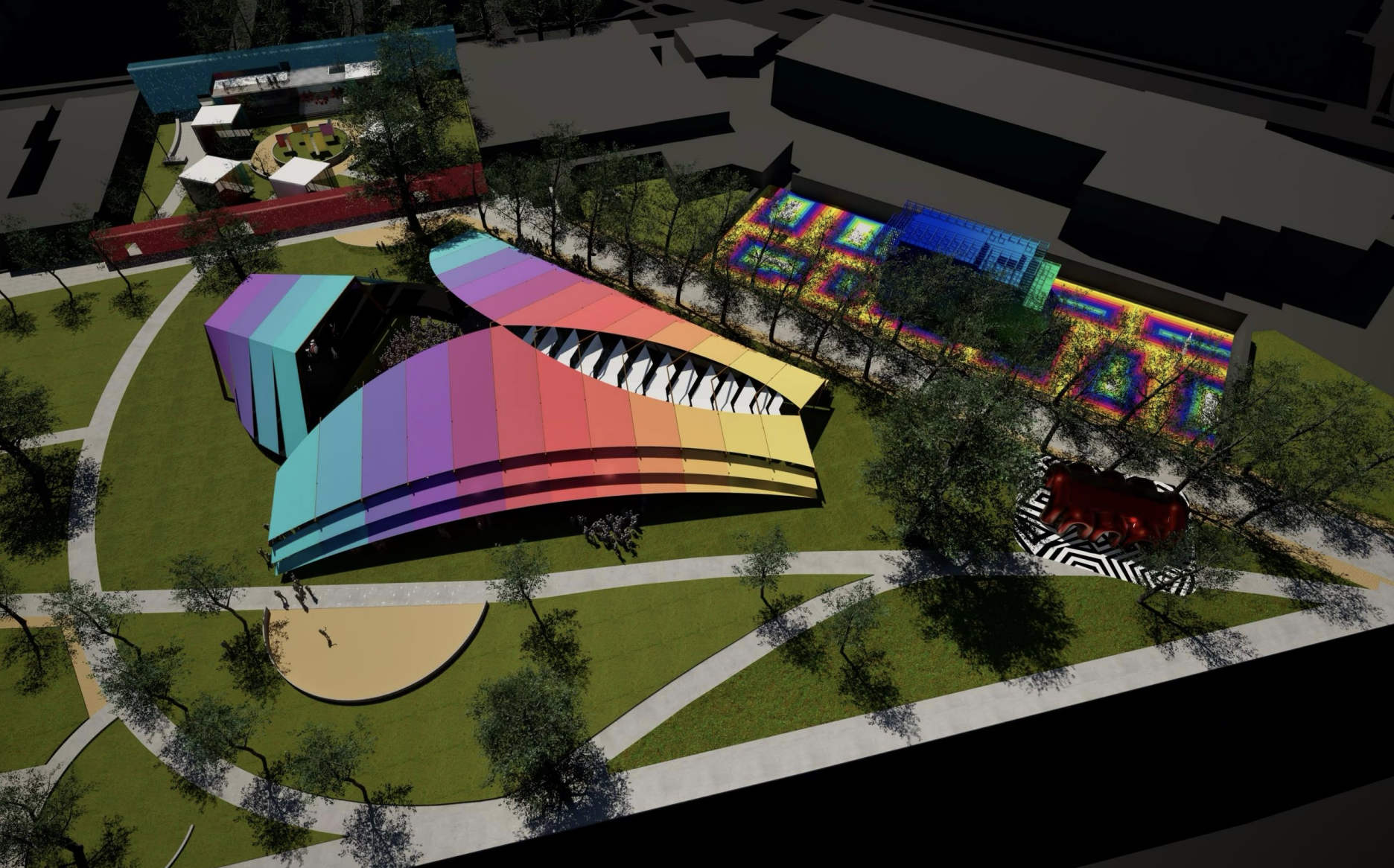
The first-ever Olympic hospitality house began with humble roots in 1992: a tent pitched on the Port of Barcelona for athletes to gather with their families. Since then, they transformed into fixtures of several major sporting events, with hopes of fostering belonging and safety for athletes of various cultural backgrounds.
It wasn’t until 2010 that the first LGBTQ+ hospitality house, the Pride House, appeared during the Winter Olympics in Vancouver. Over the years, its existence and visibility have faced barriers. During the 2014 Sochi Winter Olympic Games in Russia, Pride House International was denied from organizing its safe hub. The rejection was a blow to the visibility and safety that the organization was trying to promote and create for queer athletes. But this didn’t go unnoticed. International fans demonstrated quiet resistance, hosting remote Pride Houses in support of the Olympians who were barred from openly communing and celebrating together.
As Los Angeles prepares to host the Summer Olympics in July 2028, Pride House is coming back stronger than ever. In early October, the West Hollywood city council approved an agreement that would allocate $1 million to sponsor Pride House LA/WeHo as they prepare to build a temporary structure at West Hollywood Park for the 2028 Games. For 17 days, vibrant LGBTQ+ sports programming will fill the park’s grassy knolls.
Pride House LA/WeHo CEO Michael Ferrera detailed at a Nov. 1st Out Athlete Fund fundraising event that the team plans to build a concert stage to seat over 6,000 people. There will also be a museum that will take viewers through 100 years of queer Olympics history, viewing areas for people to watch the games, and a private athlete village for queer Olympians. “The dream of that is — imagine you’re an athlete from a country where you can’t be out,” said Ferrera. “You come here, and you can be safe and sound.”
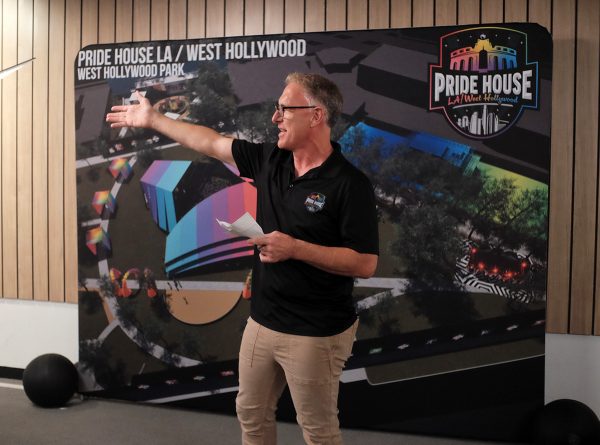
As outlined in the city council agreement and stated by Ferrera, most of the programming will be free and open to the public, and in the heart of a neighborhood that many of the county’s queer residents recognize as their safe haven. “We’re centering this important event in West Hollywood Park where our community has come together for decades in celebration, in protest, to support each other and to live our lives,” Pride House LA/WeHo CEO Michael Ferrera wrote to the Blade. “There is no place that is more representative of inclusion and safe spaces.”
The City of West Hollywood is promoting this inclusion further by asking for local community members to voice their perspectives on the formation of Pride House LA/WeHo at West Hollywood Park. On Monday, a community conversation will take place at Plummer Park to encourage residents to help shape the cultural programming that will take place in the summer of 2028. Another conversation will take place on Nov. 21st at the City’s 40th anniversary of Cityhood event.
“We couldn’t do this without the generosity and partnership of the city of West Hollywood,” Pride House LA/WeHo marketing co-lead Haley Caruso wrote to the Blade. “We are so happy to help bring the Olympic spirit to West Hollywood while also providing the community a safe and entertaining venue to enjoy the Games.”
Head to PrideHouseLAWeho.org for more information
West Hollywood
Drag performers delight Carnaval crowds with demure and daring dances
The Halloween party is one of the most anticipated events for queer Angelenos.
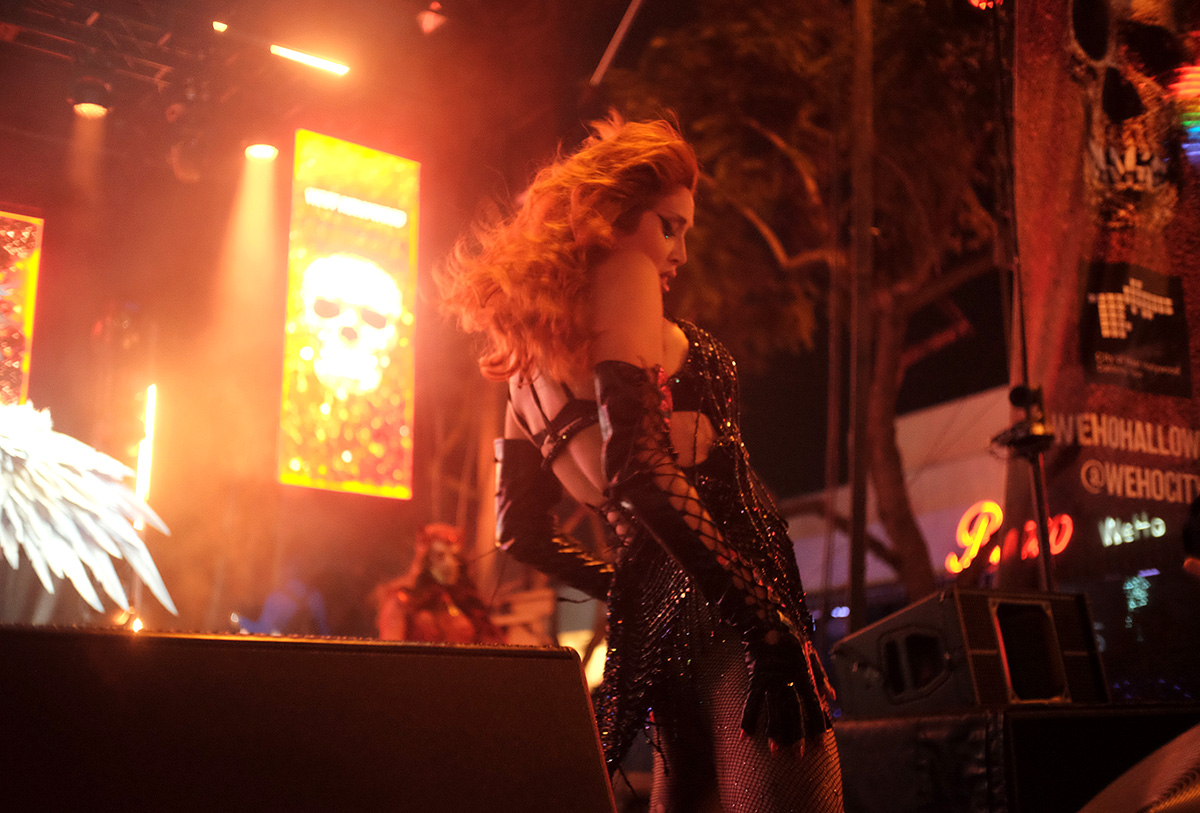
On Friday night, techno pop remixes surged through a tight block on Santa Monica Boulevard, where hundreds of eager partygoers danced near a pop-up stage. Bass-heavy grooves echoed across neighboring streets as Beetlejuices, angels, and vampires swayed and thumped to the beat.
Oct. 31 marked the arrival of West Hollywood’s annual Halloween Carnaval, one of the county’s citywide celebrations — and one of the most anticipated for queer Angelenos.
The first Halloween Carnaval was celebrated in 1987, and has since become one of the most awaited nights for local queer celebration. Drag performers donning elaborate costumes and glamorous makeup set the stage ablaze as they strutted, flipped their hair and danced to the cheers of a crowd that grew enormously as the night went on. The energy was infectious, and the Los Angeles Blade was on the scene to photograph some of these moments.
Image captures by Blade reporter Kristie Song.
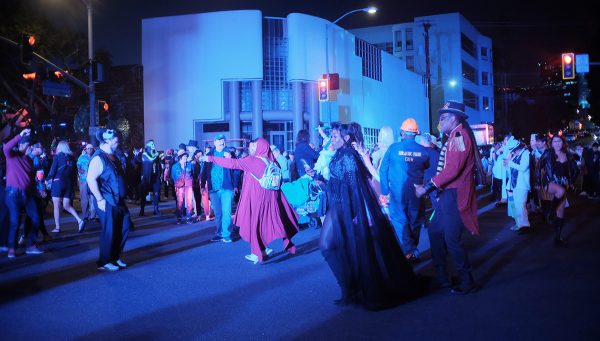
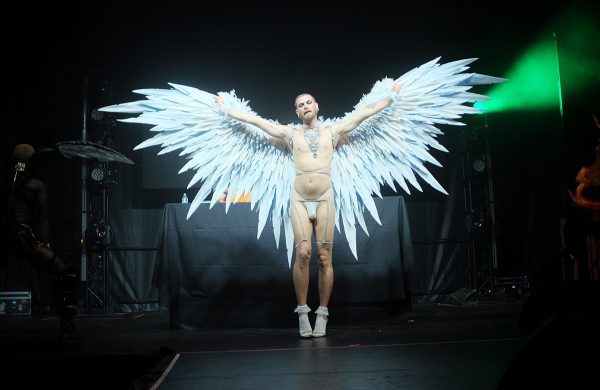
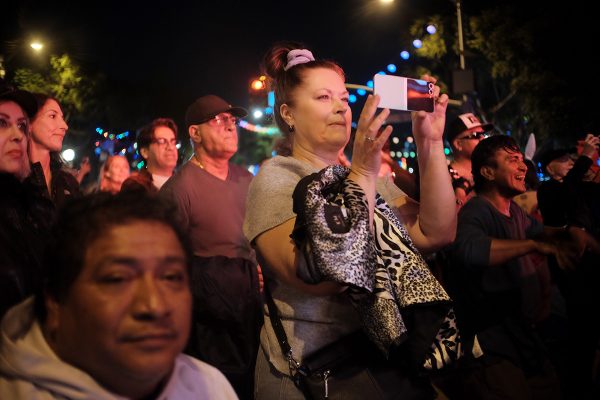
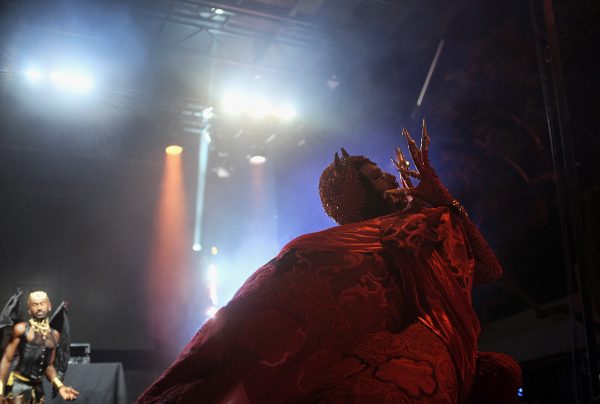
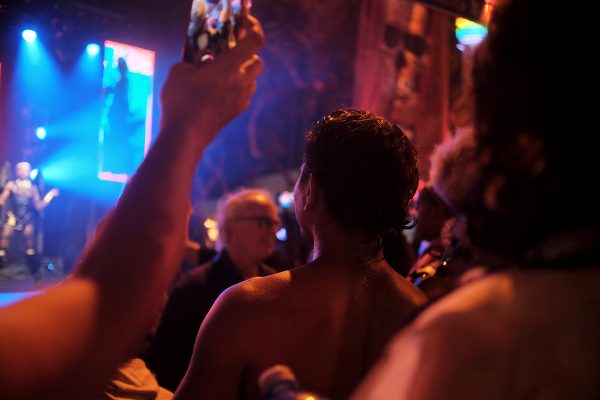
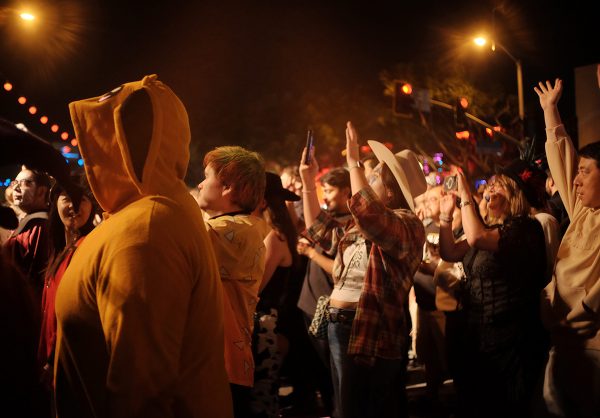
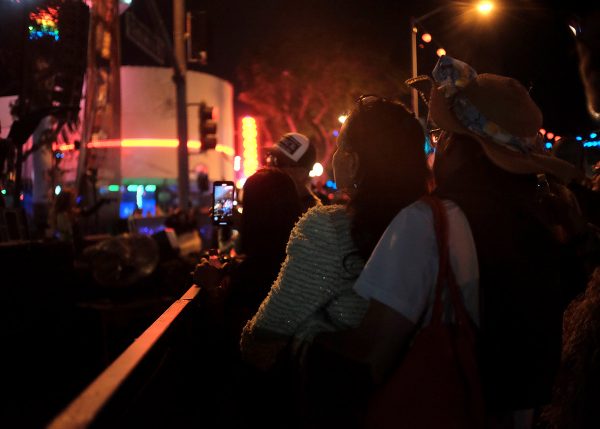
West Hollywood
West Hollywood installs new intersex pride flags on Intersex Awareness Day
On Sunday, city councilmembers gathered to raise two new pride flags to honor intersex community members
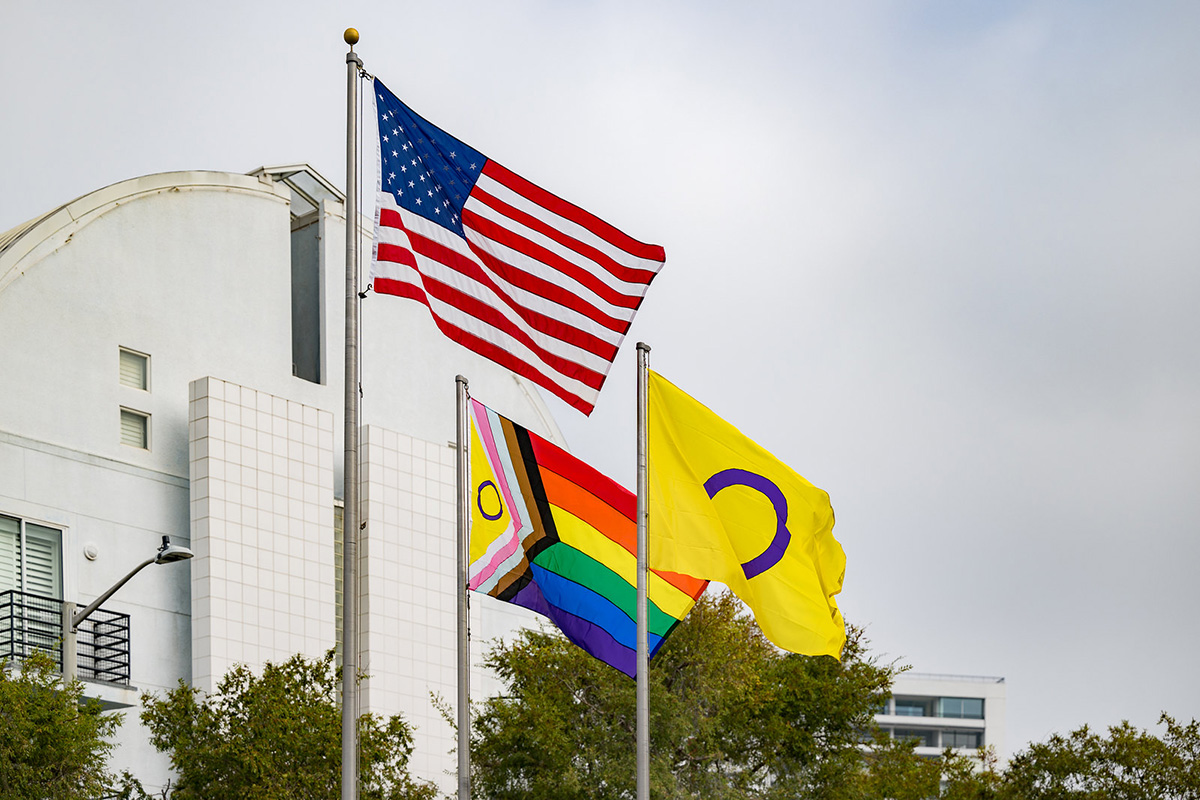
Early yesterday morning, on National Intersex Awareness Day, West Hollywood mayor Chelsea Byers, Vice Mayor John Heilman, as well as councilmembers Danny Hang and John M. Erickson gathered to install and raise two new intersex pride flags. They fly side by side with the American flag, upholding the City of West Hollywood’s vision of solidarity between national pride and LGBTQ+ visibility.
“We are facing unprecedented attacks on our community. It is important that we recognize the entirety of the LGBTQI+ community,” Vice Mayor John Heilman wrote to the Blade. “Intersex people have long been ignored and their issues disregarded. Raising the intersex flag also raises awareness about the challenges many intersex people face.”
Intersex people are born with naturally occurring variations in reproductive and sexual anatomy that don’t fit into binary “male” or “female” categorizations. As Planned Parenthood details, this can look like having both ovarian and testicular tissues or having combinations of chromosomes that aren’t “male” or “female,” just to name a few. According to the Human Rights Campaign Foundation, one of the biggest issues intersex people face is non-consensual surgeries performed when they are children. These operations are considered medically unnecessary and can leave lasting physical and psychological damage on intersex youth.
The fight for bodily autonomy and intersex visibility was the main reason behind the first action organized by intersex advocates and trans allies on Oct. 26th, 1996. Protestors stood outside the Boston Convention Centre, passed out leaflets, and spoke with clinicians, nurses, and other medical professionals attending the annual American Academy of Pediatrics conference.
One of the main leaders behind this movement was Morgan Holmes, an intersex woman who had experienced a violating medical procedure meant to “correct” her anatomy. In May of 1996, she presented testimony in a room adjacent to a symposium on genital surgery for intersex infants, a conference she and other members of her advocacy group had been rejected from.
“What I am saying is that my medical ‘care-givers’ failed to respect my autonomy or my intelligence when they assumed that because I was a child, they could do whatever they wanted as long as my father provided his consent,” Holmes said. “And when I began to balk, instead of questioning their own treatment of me, they blamed my body, and they cut it up.”
Today, intersex people and their stories are more broadly recognized, but still struggle to reach mainstream audiences when it comes to discussions around LGBTQ+ identity. West Hollywood city officials see this addition of intersex pride flags as a step forward. “Updating our city’s flags was my item because visibility matters,” councilmember John M. Erickson wrote to the Blade. “Intersex people have always been part of our story, and it’s time that their history, identity, and pride are recognized in the public spaces that belong to all of us.”
West Hollywood
Residents remain dubious as officials claim “no ICE involvement” at The Abbey
The Oct. 17th “undercover operation” was addressed at the latest city council meeting
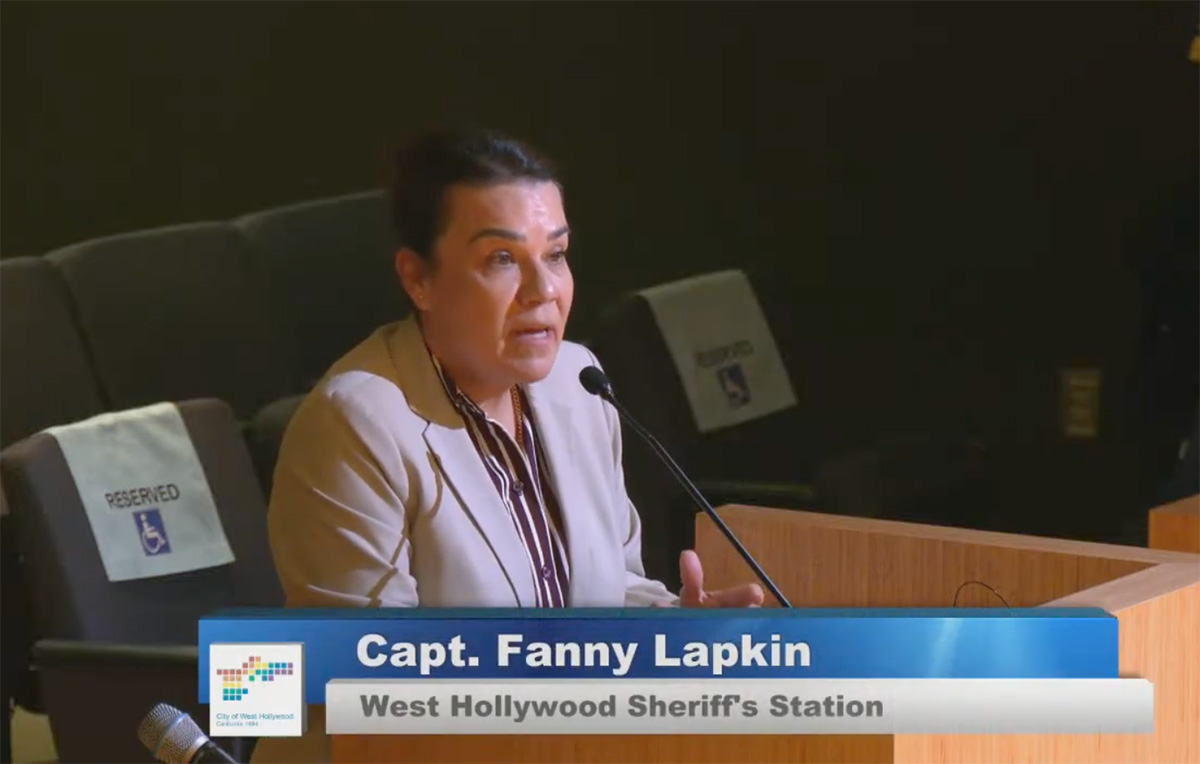
On Friday, Oct. 17th, West Hollywood gay bar The Abbey found itself in the center of a social media storm as clips were shared depicting the presumed presence of federal Immigration and Customs Enforcement (ICE) officers. In a video posted on Oct. 18th by Charles Hernandez, who often creates content around gay nightlife in Los Angeles, several people are seen standing in a line as they are apprehended and handcuffed by officers wearing sheriff’s vests and tees. Hernandez noted that, while dressed in varying attire with the word “sheriff” on it, none of the officers were willing to identify themselves or present their badges upon request.
Hernandez can be heard asking the officers about the cause for arrest, to which one responded: “I don’t have to tell you our cause.” The video creator also questioned another officer, who can be seen wearing a gaiter to cover his face. “Isn’t it illegal to wear a mask in California?” Hernandez asked. “He has COVID,” an officer replied. In September, Governor Newsom signed five bills that weakened federal agents’ abilities to access school sites and health facilities, and prohibited them from hiding their identities. More specifically, SB 627 requires all California law enforcement agencies to create written policies limiting their officers’ use of facial coverings by July 1, 2026.
As this video circulated around the web, the West Hollywood Sheriff’s Station released an online statement of their own, denying allegations that the officers present were federal immigration officers. The station also claimed that the night’s events were a result of an “undercover operation” that was conducted in response to reports made about pickpocketing and the transportation, use, and sale of illegal substances. “Several arrests were made,” the statement read. “ICE was not involved.”
Still, residents remained unconvinced, criticizing the station’s lack of transparency, careful conduct, and accountability. Over 50 people took to the comments of this statement to voice their discontent. “[It] was not that long ago when officers would raid LGBTQ spaces and arrest people simply for being there,” one comment read. “A raid such as this does not inspire feelings of safety for our community. Especially in times when people are being kidnapped off the street by masked federal agents. There simply must be a better response to pickpockets and “other criminal activity” than undercover raids by masked officers and transporting detainees in unmarked vehicles. DO BETTER.”
Two days later, at the West Hollywood city council meeting, West Hollywood Sheriff’s Station Captain Fanny Lapkin took to the podium to address some of these concerns. Echoing the station’s Instagram statement, Lapkin confirmed that the “pre-planned operation” was created in response to “concerns from our businesses and our community in regards to the pickpocketing, to the narcotics, and also to the illegal vending and some of the criminal activity during illegal vending.” Lapkin also confirmed that no federal agents were present, stating that everyone who took part in the operation was “sheriff’s department personnel.” And because the arrests were made as part of a planned operation, Lapkin further stated that warrants were not “necessary.”
The events were discussed with brevity at the meeting, but community ire has not been dispelled. Several people continue to question the ethics of this undercover operation: Why were the individuals being arrested not clearly told the reason for their detainment? Why were unmarked vehicles present? Why conduct the operation in this way, as Los Angeles neighborhoods continue to stay on high alert over immigration raids? These questions remain unanswered as more specifics about the operation have yet to be released.
-

 LGBTQ+ Youth Mental Health4 days ago
LGBTQ+ Youth Mental Health4 days agoFor queer youth, LGBTQ+ scholarships affirm their visibility and sense of possibility
-

 a&e features4 hours ago
a&e features4 hours agoAmy Madigan finds herself on the cusp of Oscar glory. Can she overcome the historic bias against horror performances?
-

 Obituary4 days ago
Obituary4 days agoAppreciating literature’s gay genius, Michael Silverblatt
-

 a&e features3 days ago
a&e features3 days agoTaylor Tookes wants you to be your own beauty standard
-

 Television2 days ago
Television2 days agoSexy financial drama ‘Industry’ is feeding the queer community
-

 Movies4 days ago
Movies4 days agoMoving doc ‘Come See Me’ is more than Oscar worthy
-

 Books1 day ago
Books1 day agoLove or fear flying you’ll devour ‘Why Fly’
-

 Commentary5 hours ago
Commentary5 hours agoLA28: Where is your moral compass?



